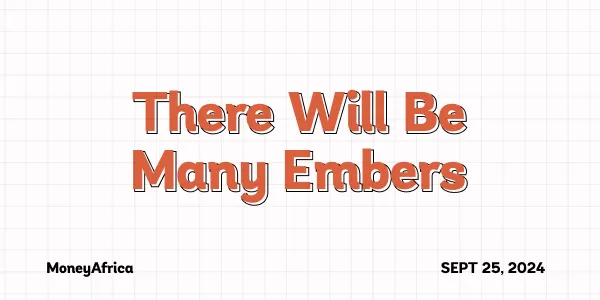In his song, “Gone Till November,” Wyclef Jean sings:
I’ll be gone till November…
You tell my girl I’ll be gone till November
January, February, March, April, May
I see you crying’ but I can’t stay…
For many people, the “ember” months often carry a sense of heightened pressure and expectations. After working hard from January to the end of the year, many travel back “home,” or for those who have “japa’d” (a popular term for emigrating abroad), they return to their home countries between November and December.
November and December are typically when people spend the most. There’s often pressure to live up to expectations from relatives and friends back home or in the village, who assume that those abroad are making a lot of money. Added to this is the reality that things back home have become much tougher economically.

Over the last year, Nigeria has experienced a significant rise in inflation, coupled with a sharp devaluation of the naira. As a result, even amounts like $50 or $100 now convert to much more local currency than they used to. Personally, in the last year (speaking from my experience in Nigeria where I spend most of my time), the frequency of requests for “urgent 2ks” (quick cash requests) has skyrocketed. In fact, I can confidently say this has been the highest I’ve seen in a decade.
So, what do you do? Do you spend your last dollar, naira, or pound and then hope to recoup from January to August? For many, that seems like the easiest thing to do. Others might use a credit card, spending freely now and planning to pay it off over the next year. But let’s be honest—that’s not a sustainable plan. You can’t keep falling into this pattern year after year.
A smarter approach is to set aside money throughout the year. This could mean putting away small amounts of dollars, pounds, naira, or cedis each month.

Now, you might be thinking, “We’re already in the ember months! How can I implement this now?” And you’re right—it may be too late for this year. But there’s always next year to plan differently. So what can you do now?
You’re left with a couple of tough choices.
For many, it might mean sending money back home instead of visiting in person. I know this is a hard choice to make. The time spent with family and friends, the shared moments, are invaluable. These are experiences you can’t put a price on, and missing out on them is difficult. But if you’re a primary provider for your family, you have to prioritize staying financially afloat, at least until you’ve built a more secure base.
If travel is absolutely necessary, along with all the expenses that come with it, you need to be transparent about your current financial situation. If you’re still settling into a new job or country, be honest with your loved ones. Don’t try to maintain appearances. Do what you can reasonably afford, and if you can’t afford much, let them know.
Don’t allow the weight of expenses to overwhelm you to the point where you start avoiding family, friends, or even their phone calls. If you’re going through a period of transition, be upfront about it.
In the long run, the best way to handle these recurring expenses—whether they’re for annual or quarterly visits, or support for bills back home—is to create a financial plan that accommodates them. This could mean dedicating a portion of your investments specifically for these costs.
It might take dedicating a full year’s worth of savings or investment to prepare for this, but it will offer you some breathing room and enable you to focus on achieving your own financial goals.

If you would like to sign up for a one-on-one session, please send an email to sales@themoneyafrica.com or send a DM to any of our social media platforms.
There will be many more months to come.
***
Do you know that we have our own podcast? It’s MONEYTALKS!💚
Here’s a link to listen to all the amazing episodes we have!
***
Thank you for reading Money Africa’s Blog.
Please feel free to share it.
Do you have any questions? You can send an e-mail to info@themoneyafrica.com or send a DM to any of our social media channels.
***
MoneyAfrica premium plan
Are you a mid to high-income earner? Do you find communities a bit too busy? You should sign up for our premium plan.

You can learn more about that here.
***
We often get questions regarding how to plan your finances to align with your relocation plans, especially for students seeking to further their studies. As always, we have heard you, and we have put together an e-book to help you navigate this. Follow this link, to get your FREE copy of the e-book: The Japa Encyclopedia.
***
Get our annual subscription and learn more about investing safely and building a solid portfolio in 2024.
Don’t forget to:
- Join our community, if you want to smash your 2024 financial goals. It takes at least 30 days to build great habits that will last you a lifetime. So why not start now? There is a lot you can achieve.
- If you would like to document your financial journey in 2024, then our journal would be an excellent fit for you. It costs ₦7,500 (excluding delivery).
- Get a budget sheet to track your monthly expenses. Click here
- Get an investment tracker to be on top of all your investments. Click here
MoneyAfrica is a financial literacy platform. Our goal is to make everyone better with their finances.
We do this by engagements via our:
– social media handles
– platforms for paid community members (for adults and students)
– webinar sessions with corporate clients
Would you like to join any of the communities? Please click here
Would you like us to hold a webinar for your company’s staff? Please send an email to info@themoneyafrica.com


